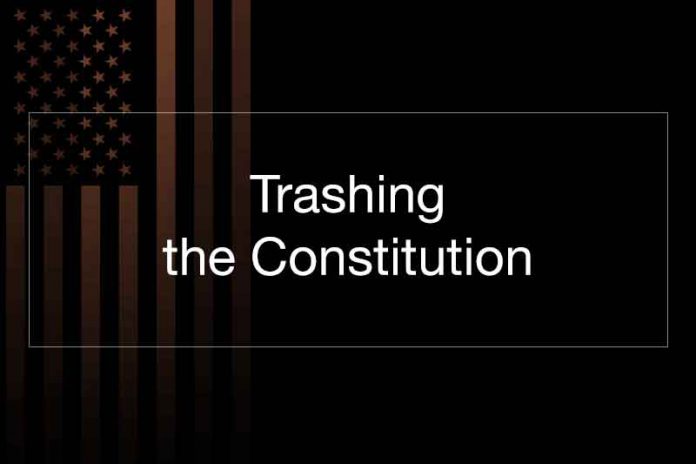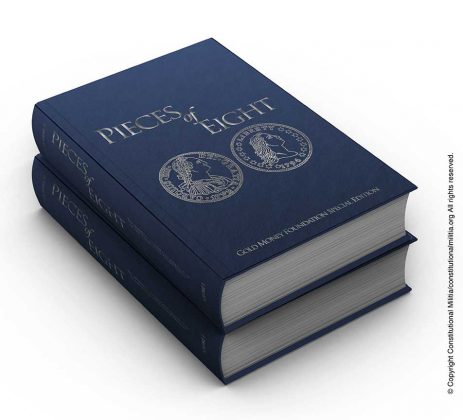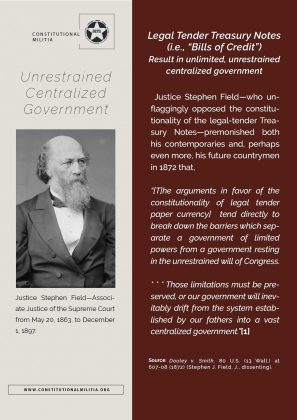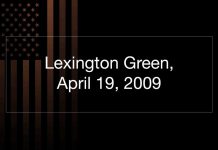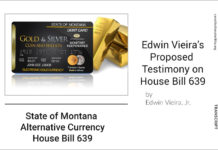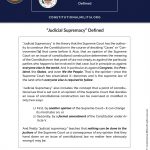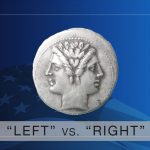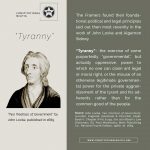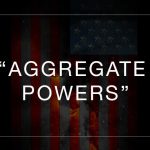Last Updated on September 10, 2021 by Constitutional Militia
[The following speech was delivered by Dr. Vieira to The Rotary Club of New York, March 25, 2003, at the Princeton Club, New York, N.Y. The speech was slightly edited for clarity.]
Introduction by Dr. Lawrence Parks, Executive Director, FAME
Before I introduce Dr. Vieira, I want to spend less than two minutes positioning his topic. Our monetary system is an abomination. It violates almost all of the principles that civilized people hold dear:
From the Biblical point of view, our monetary system violates the admonitions in Deuteronomy not to tamper with weights and measures, and, as clergymen pointed out after the Civil War, it violates the Eighth Commandment not to steal.
Under Jewish Law, it violates the gnivas das commandment not to misrepresent.
From a moral point of view, mindful that our money is legal tender, Salmon Chase, when he was Chief Justice of the Supreme Court in 1869, wrote that the legal tender quality of money is only needed for the purposes of dishonesty.
Economically, fiat monetary systems such as ours have been collapsing for nearly 1,200 years wiping out savings and promises of future payments, such as pensions and annuities. There have been no successes.
From a scientific viewpoint, Isaac Newton put the kabaach on fiat money at the end of the 17th century when he declared that such money would have no defined unit of measure. That is, our money has nothing to tie it to reality. It is part of the spiritual world. Today, economists describe money as an “illusion”.
In terms of personal relationships, our monetary system violates the sanctity of contracts, because one does not know what will be the value of future payments. That is, it violates the notion of keeping promises, which is the glue that holds civilization together.
Now comes Dr. Edwin Vieira who teaches that our monetary system violates the Rule of Law, something that we all hold dear and that our politicians give lip service to. Particularly, he teaches that it violates the supreme law of our land: the Constitution.
There is no one better qualified to talk to us about this issue than Ed Vieira. A Harvard trained attorney with a doctorate in chemistry, also from Harvard, Ed is the world’s most foremost authority about the role of our Constitution as it relates to money.
He is also one of our country’s most eminent constitutional attorneys, having brought four cases that were accepted by the supreme Court and having won three of them. Those of you who are practicing attorneys know what an extraordinary record this is.
Ed’s work came to my attention by accident in the early 1980s. I was at a dinner party sitting next to one Richard Solyom, who at that time was one of Ed’s legal clients. It was Dick Solyom who first gave me a copy of Pieces of Eight: The Monetary Powers and Disabilities of the United States Constitution, which was the outgrowth of a case that Ed had argued on Solyom’s behalf. That book was 300 pages and made a very tight case, I thought at the time.
During the last six years, Ed has rewritten Pieces of Eight. Now it is 1,700 pages with 6,000 citations.
When he sent me an early bound draft, which was then just one volume, Ed asked me if I thought many people would read it. I told him that I didn’t think many people would lift it.
While reading such a large specialized book may seem like a daunting task, please know that Ed is a very talented writer. There are large sections that read like an adventure story. Pieces of Eight is beautifully written and impeccably researched. It is a true masterpiece.
To get a taste for Ed’s writings, I have brought a few complimentary copies of his essay “The Forgotten Role of the Constitution in Monetary Law,” which appeared in the Texas Review of Law & Politics. There are also several of his essays on the FAME.org website. We are most grateful that Ed has taken time from his busy schedule to travel up from Manassas to speak to us.
Will you please join me, and give a very warm Rotary Welcome to Dr. Edwin Vieira.
Thank you ladies and gentlemen. It’s my pleasure to be here all the way from Manassas, Virginia, the very backwater of civilization. It’s outside of Washington. My topic is the monetary powers and disabilities of our Constitution; what the government may do, and what it may not do with respect to coinage, currency, credit, and banking.
Now these, to put it bluntly, are not common knowledge. They’re not common knowledge among lay people, and they’re not common knowledge among lawyers. Indeed, in my experience, very few people can talk intelligently about this subject.
You may ask, “So what? Isn’t this a matter that’s really best left to Congress, and the Treasury, and the Federal Reserve, and the Supreme Court, and so forth; the legal and political elite?” Well, I could give you a number of very important reasons why that is not the case, why this is a vitally important subject to you. I could talk about economic reasons, the fundamental one being that a free market functions most efficiently and most fairly when the market determines the quality and the quantity of money that’s being used.
I could talk about political reasons: that throughout history we have seen again and again the instability, the turbulence, in fact the self-destructive tendencies of political systems in which politicians and special-interest groups exercise the power to control or manipulate the purchasing power of money.
Today I could give you geostrategic reasons, because one could easily work out a theory whereby Islamic Fundamentalists, if they understood what they were doing, could strike at the Great Satan by attacking the fragile foundations of our monetary and banking system. I’m not going to tell you about that, because I don’t want to give aid and comfort to the enemy.
I shall touch only on the legal reasons why monetary powers and disabilities are of vital importance. I want to emphasize at the outset that this is not a matter of my opinion or my views. This has nothing to do with personalities or subjective ideas. It’s a matter of what the Constitution provides. That is a matter of historical investigation and understanding from which objective results can be obtained.
I know it’s a little hard work, as Larry pointed out, to read Pieces of Eight. I had to be purer than Caesar’s wife. Everything has been documented. The reason I did that was to show people that everything can be documented. There is nothing in the book that comes from my pen. It comes from the pen of the Founding Fathers. It comes from the pen of the Supreme Court. It comes from the pen of the people that keep the Congressional records. This is all a historical matter.
My reason for getting into this subject is that I’ve always viewed the legal perspective as being the most important aspect of the problem. Why? Because the legal framework in any society is going to have a controlling, a directive, at least an important influence on what happens economically. A society that is based upon freedom of contract and private property is going to have a different set of economic outcomes than a society that is based on a Stalinesque model of central planning. The legal system has a tremendous effect on the economy.
I’d like to make a point here. The government of the United States has never violated anyone’s constitutional rights. Did you know that? The government of the United States will never violate anyone’s constitutional rights, because it cannot violate anyone’s constitutional rights. The reason for that is: The government of the United States is that set of actions by public officials that are consistent with the Constitution. Outside of its constitutional powers, the government of the United States has no legitimacy.
It has no authority; and, it really even has no existence. It is what lawyers call a legal fiction. I give you the famous case Norton v. Shelby County, when they were thinking straight about these issues: 1886. The Court said: “An unconstitutional act is not a law; it confers no rights; it imposes no duties. It is, in legal contemplation, as inoperative as though it had never been passed.” And that applies to any governmental action outside of the Constitution.
Our present constitutional system, with respect to money and banking, is oxymoronic, because in fact, for a very long time, with respect to coinage, currency, credit, and banking, the political class and the judicial class have not conformed to the Constitution. In the grand scheme of things, there are legal consequences that follow from not adhering to constitutional powers and disabilities, especially constitutional disabilities.
What is the genius of, the condition sine qua non, for a free society? It’s limited government, right? A totalitarian society is one in which the government claims all power; there is no freedom that the government doesn’t allow. There’s always a certain interstitial amount of freedom even in totalitarian society. Remember 1984, Winston Smith? There was a little place in his apartment where he could hide from the telescreen, right? And write his memoirs.
So interstitially, even a totalitarian society can’t control everything; but it states, in principle, its right to do so. What are the defining characteristics of a limited government? They are its disabilities; what it does not have legal authority to do. Look at the First Amendment. Everyone’s familiar with the First Amendment. What does it do? It guarantees freedom of speech, freedom of press, freedom of religion.
But how does it do that? I quote: “Congress shall make no law abridging the freedom of speech or of the press” et cetera. “Congress shall make no law;” that’s a statement of an absence of power. That’s a statement of a disability. The problem we’ve had in the monetary system is there has been an increasing misuse of Congress’ monetary powers, and an increasing disregard of Congress’ monetary disabilities; and not only in this particular field, of course, in many other fields. But what’s happened in the area of money and banking exemplifies, and in many instances, is the source of what’s happened in other areas.
I can divide this degeneration essentially into two categories. One is the application of the so-called “theory of the Living Constitution.” The other is the over extension of Congressional powers, or the assertion of powers the Congress doesn’t have. Many people may be familiar with the “Living Constitution.” This is the idea that the meaning of the Constitution has to change with the times. The Founding Fathers lived in the horse-and-buggy era. We live in the spaceship era. Obviously, the Constitution has to somehow evolve intellectually to deal with those changes. In effect, this reduces the Constitution to whatever the politically powerful find it expedient to mean from time to time. You could call that “situation law.” I call it “Sante Fe law.” They railroad their ideas through, and they expect us to accept it on faith.
Let me give you an example, the key example in the monetary field. Basic question: “What is a dollar?” Interesting question: “What is a dollar?” That’s the unit of our currency. What is it? Well, if you ask most people, some of them would pull one out these things, a little Sacagawea coin. “This is a dollar.” Or more likely they would probably pull out one of these, a George Washington Federal Reserve Note, and say, “This is a dollar.” And if you asked that person, “Well, why is this thing a dollar?” he or she would probably say, “Well, it’s because Congress says so,” or “the Treasury says so,” or “the Federal Reserve System says so,” or “the Supreme Court says so”—begging the question of whether Congress, the Treasury, the Federal Reserve, or the Supreme Court has the authority to say so. Is this simply a matter of raw power?
Let’s have a quick reality check. I have some learning aids here. Here’s a card that says, “One cow.” Is this a cow? Next step: here’s a card that says, “By order of Congress: one cow.” Is this a cow? You’re getting the picture, aren’t you? Here we go, the next step: “By order of the Federal Livestock Board: one cow.” And then the final absurdity: “By order of the Federal Livestock Board: one cow. This is legal tender for all debts public and private.” You don’t have to be a farmer to understand the meaning of this little demonstration.
Let’s take it to another level. “One dollar.” Is it a dollar? “By order of Congress: one dollar.” “By order of the Federal Reserve Board: one dollar.” “By order of the Federal Reserve Board: one dollar. This is legal tender for all debts public and private.” Do you follow this? This is kindergarten material. As the Gershwins told us in Porgy and Bess, “it ain’t necessarily so” simply because someone writes it on a piece of paper.
Where do we look to find Congress’ powers and disabilities in this regard? Well, I guess you look in the Constitution. The Constitution actually mentions the word “dollar” in Article One, Section Nine, Clause One, the famous slave tax provision, that provided a tax or duty might be imposed on the importation of slaves, not exceeding ten dollars for each person. Do you think that was important at the time? It was one of the provisions that was put in as part of the compromise between the Southern slave-owning states and the Northern states. If something like that hadn’t been put in, the Constitution probably would never have been ratified by all the original colonies.
It’s also found in the Seventh Amendment, the word “dollars”: “In Suits at common law, where the value in controversy shall exceed twenty dollars, the right of trial by jury shall be preserved.” Do you think that was important to those people at that time? Trial by jury was known in that era as the palladium of British liberty, going back to Magna Carta. Do you think those people knew what the word “dollar” meant? Do you think they thought it meant this? [holding up a Federal Reserve Note] It must have had an accepted meaning at that time.
The proponents of the “Living Constitution” will say: “That time has passed, and now we have Congress, the Treasury, the Federal Reserve, the supreme Court, whatever, to make a new determination”—of course begging the question of whether the definition of the “dollar” can be changed. I want to give you what I think is a conclusive analogy on this point.
If you read the Constitution, you’ll find the word “year” used. For instance: “The House of Representatives shall be composed of members chosen every second year by the people of the United States.” “The Senate of the United States shall be composed of two Senators from each State, chosen by the legislature, for six years.” If the meaning of “dollar” can be changed by Congress, why can’t the meaning of “year” be changed?
The principle is exactly the same. Yet we all know that if the Congress passed a statute, and the supreme Court upheld it, saying that for constitutional purposes the word “year” will no longer mean three hundred and sixty-five days, but seven hundred and thirty days, or fourteen hundred and sixty days, or some arbitrary number, they would he howled down in hoots of ridicule. No one in this country would accept that. In fact, even we the people, amending the Constitution as we can do under Article Five, could not change the true definition of the word “year.” We could change the term of the Representative to something other than two years, the Senator to something other than six years; but we could not amend the Constitution to say that a “year” is something other than what it is. We cannot fly in the face of astronomical reality. Well, if it’s obvious for the word “year,” why isn’t it just as obvious for the word “dollar”?
You all know what the word “year” means in its astronomical significance, and therefore you know what it means in its constitutional significance. And if you knew what the word “dollar” meant in its historical significance, you would know what it meant, or what it means, in its constitutional sense. What did that word mean to the Founding Fathers? It certainly didn’t mean the Sacagawea dollar. It meant this: the Spanish milled dollar. [holding up a coin] And not just in the late 1700s.
The Spanish milled dollar was made the unit or standard for all foreign silver coins in the American colonies in 1704 by Queen Anne (there was a Parliamentary statute in 1707). It was made the standard for the United States by the Continental Congress under the Articles of Confederation, before the Constitution was even written. So in fact the dollar preceded the writing of the Constitution. It preceded the ratification of the Constitution. It preceded the first Congress, the first President, the first supreme Court, the Federal Reserve Board, and everything else. Do you think it might be independent of all those things, having preceded them?
As a historical fact, the dollar is independent of the Constitution. The father of the dollar, in our system, was Thomas Jefferson. He was the one who proposed it to the Continental Congress. In the first government under the Constitution, Jefferson was Secretary of State, and Alexander Hamilton was Secretary of the Treasury. They didn’t agree on very much, if anything, except this: They both agreed on the monetary system. The Federalists and the Anti-federalists were in complete agreement. And what did Congress and the Treasury do in 1792 with the first coinage act? They went out to determine what the value of this “dollar” was.
How did they do that? They went to the marketplace. In what we would call statistical analysis, they collected a large sampling of Spanish milled dollars that were circulating, and they did a chemical analysis of them to determine on average how much silver they contained. This appears in the Coinage Act of 1792 where they wrote: “The Dollar or Unit shall be of the value of a Spanish milled dollar as the same is now current,” that is, running in the market, “to wit, three hundred and seventy-one and one-quarter grains of silver.”
Now you know something that 99.999% of Americans do not know, and probably a higher percentage of lawyers. The “dollar” is a silver coin containing three hundred and seventy-one and one-quarter grains of silver—and it cannot be changed by constitutional amendment, definitionally, any more than the term “year” can. And yet, as I mentioned before, if you ask the average person what a dollar is, he’ll probably hold this thing up. [holding up a Federal Reserve Note] Is there something wrong here? Do we see some kind of cognitive dissonance when we have a problem with this? I should hope so.
The second area in which the misuse of monetary powers and the disregard for monetary disabilities has corrupted the Constitution, as I said before, is the overextension of powers. I won’t go into these in great detail. If you look at the “Necessary and Proper” clause, which has been wildly expanded to give fantastic powers to Congress, what is the foundational case for that expansion? It’s usually cited to be McCulloch v. Maryland in 1819. What was that case about? It was about the Bank of the United States. It was a money case.
If we go to the doctrine of “Emergency Powers,” which is having a great uplift today, for obvious reasons, what was the foundational case that put that doctrine on the constitutional map? It was Knox vs. Lee, the legal tender cases brought after the Civil War. If we go to the doctrine of “Aggregate Powers,” the doctrine that says, “You can take a little here and a little there and kind of sum them all up, so that the whole is greater than the sum of the parts,” again we go back to the Knox case, a monetary case.
What’s very interesting is to read a dissenting opinion by Justice Stephen Field, the only Justice on the supreme Court who had the integrity to dissent in every legal tender case that he heard. He wrote a dissenting opinion in Dooley vs. Smith, in 1872. He wrote, “The arguments in favor of the constitutionality of legal tender paper currency tend directly to break down the barriers which separate a government of limited powers from a government resting in the unrestrained will of Congress. Those limitations must be preserved, or our government will inevitably drift from the system established by our Fathers into a vast, centralized, and consolidated government.”
You notice he was not talking specifically about the monetary powers. He wasn’t saying that these arguments would lead to the monetary powers being unrestrained. It was destroying the concept of limited government. “The arguments in favor of the constitutionality of legal tender paper currency tend directly to break down the barriers which separate a government of limited powers from a government resting in the unrestrained will of Congress.” How do you define, or how would you characterize, a government resting in the unrestrained will of Congress, or any other political body? It is by definition a totalitarian government.
The philosopher Richard Weaver, and I’m sure you’re familiar with this statement that he made, said, “Ideas have consequences.” He could have gone further than that. He could have said that bad ideas, once they are politicized, almost inevitably generate crises and catastrophes. If we look throughout American history, we will see that failures of various unconstitutional currency and banking situations, and we’ve had different ones over different periods, have inevitably led to crises and catastrophes. Pre-Civil War, we had a series of cycle collapses (they called them panics in those days), which were brought about by the unstable system of state banks and, to a certain extent, by the national banks that Congress created, the two Banks of the United States.
If you go into the Civil War, you have the crisis of massive inflation that was caused by the emission of the greenbacks, and then the tremendous political controversy over the continuation or the termination of paper money inflationism. Then we come to the Federal Reserve System. Some people here may know of the arguments that were made in favor of the Federal Reserve System. It would have an elastic currency. Through scientific management of the monetary system, depressions would be eliminated. There would be stability in the banking system. What happened?
The Federal Reserve System was there when the greatest banking collapse in American history occurred, in 1932-1933, and in what was called the Great Depression of the 1930s. In that period what happened? The Roosevelt New Deal. What were the powers they were screaming for? Emergency powers. You’ll find that written into many statutes, e.g., The Emergency Banking Act of 1933. You should pay attention to the title, The Emergency Banking Act of 1933, and the “Aggregate Powers” doctrine. It’s been all downhill since then.
I will not say, and I doubt that anyone could say, or defend the idea, that if the constitutional monetary system had been strictly enforced throughout American history there would have been no economic crises, because we all know that economic crises are not caused solely by bad monetary and banking arrangements. But, as sure as I am standing here, I can say that if the Constitution had been observed during that period, there would have been none of the crises that did in fact occur. They would have been essentially impossible, bringing me back to the point I made earlier about the primacy of law.
How should that have been done? Well, Americans would have had to understand and enforce their Constitution. You notice I say Americans, not the Congress or the supreme Court, because who is the final arbiter of this document? [holding a copy of the Constitution] It is not Congress, and it is not the Supreme Court. It is “We the people.” Read the thing. How does it start? “We the people do ordain and establish this Constitution for the United States”; not “we the politicians,” not “we the judges.” Those people are the agents of the people. We the people are the principals.
The doctrine is very clear that, being the principals, we are the Constitution’s ultimate interpreters and enforcers. You don’t have to take my word for it. Let’s go back to the Founding Fathers, if I can find the right place. [referring to a book]
The Founding Fathers were profound students of law and political philosophy. Their mentor in that era was William Blackstone, who wrote Blackstone’s Commentaries, probably the most widely read legal treatise of its time, certainly here in the United States. What did Blackstone write about this subject? He wrote, “Whenever a question arises between the society at large and any magistrate vested with powers originally delegated by that society, it must be decided by the voice of the society itself; there is not upon earth any other tribunal to resort to.”
We the people are the Constitution’s ultimate interpreters. But we all know that no people leads itself.
Every people, for whatever reason, needs leadership. I look out on you people here today. You are representatives, or a cross-section, if you will, of this country’s elite. I don’t say that to be flattering. I don’t say that to be patronizing. In fact, I’m a messenger who, in a sense, is bringing you some bad news, because the American people out there have to depend on people like you in here, and others like you, for leadership. There’s a very simple reason for that. There’s no one else. Therefore, here’s the bad news: it ultimately is your responsibility to find out what your Constitution means with respect to monetary powers and disabilities, and then to do something about it, before history takes the opportunity out of your hands, and we all suffer the consequences.
Thank you.




























